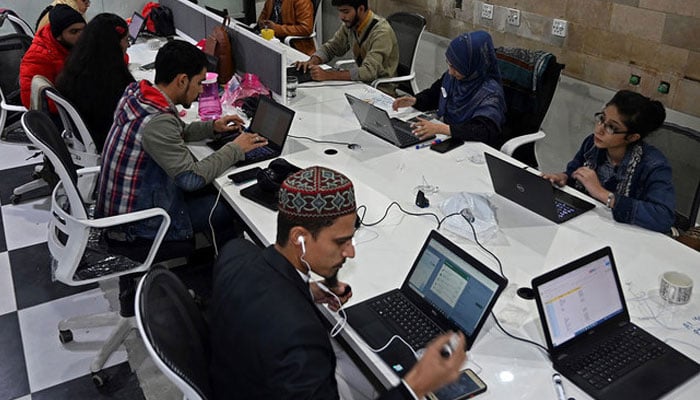Tech sector endures slowest quarter in three years
The sector’s contribution to GDP in the fiscal quarter ending June is projected to be just Rs258.3 billion
KARACHI: After over a decade of robust performance, Pakistan’s information and communications sector has recorded the lowest growth in three years (12 quarters) as per a report by IT consulting firm Data Darbar. The sector’s contribution to GDP in the fiscal quarter ending June is projected to be just Rs258.3 billion.
Based on the report’s analysis of data from the Pakistan Bureau of Statistics, the sector’s GDP contribution is projected to decline by 3.02 per cent in FY2023-24 overall. This is the second consecutive fiscal year the sector has contracted. Notably, the drop is much sharper this year after a more modest 0.8 per cent fall off in FY2022-23. This decline comes after a decade as the fastest growing broad sector in the economy, increasing at a compound annual growth rate of over 6.0 per cent between FY2014-15 and FY2023-24. Often used as a proxy for the tech sector, information and communications also includes telecommunications and broadcasting and publishing. According to the report, the current slowdown extends to tech as well -- with ICT exports rising by just 2.5 per cent in 2023 to $2.72 billion. This is the slowest rate of increase since 2015 and the second year in a row ICT exports growth has been in the single digits.
Pakistan’s ICT exports also remain highly concentrated, with the UAE and US accounting for almost 74 per cent of the country’s ICT exports.
Talking to The News, Data Darbar co-founder Mutaher Khan says that, while there has been a global slowdown in IT, this should not have an outsized impact on Pakistan’s tech sector given the country’s relatively small footprint in the global market. Instead, he points to the uncertainty in the rupee since May 2022 that has led to more money being parked outside the country which translates into lower export figures.
Khan also points to a stagnation in terms of the supply of IT and other technical graduates in Pakistan. “The entry of technical people into the market is no longer growing as fast and the supply of the universities is roughly where it was three years ago”, he adds, highlighting the lack of growth in terms of those with the required skills.
A post-budget press release by the Pakistan Software Houses Association (P@SHA) also highlighted the skills deficit in the tech sector. The higher income tax burden on the salaried class “will further fuel the brain drain of the skilled workforce from the IT industry of Pakistan”, explained P@SHA, its Chairman Muhammad Zohaib Khan saying that the IT industry is already grappling with a lack of skilled and highly-skilled workforce. He added that “the government should have given a special package to the human resource pool to enable IT companies [to] continue with the momentum of double-digit growth in IT exports”.
In terms of what the government can do to help the sector, Mutaher points towards facilitating access to hardware instead of making devices more expensive through additional taxes, allowing export-oriented companies complete retention for forex and easing the repatriation process and ensuring connectivity by not throttling internet speeds and encouraging investments. For sustained long-term growth, making investments in the education sector and expanding the labour supply will be imperative.
-
 Winter Olympics 2026: Lindsey Vonn’s Olympic Comeback Ends In Devastating Downhill Crash
Winter Olympics 2026: Lindsey Vonn’s Olympic Comeback Ends In Devastating Downhill Crash -
 Adrien Brody Opens Up About His Football Fandom Amid '2026 Super Bowl'
Adrien Brody Opens Up About His Football Fandom Amid '2026 Super Bowl' -
 Barbra Streisand's Obsession With Cloning Revealed
Barbra Streisand's Obsession With Cloning Revealed -
 What Did Olivia Colman Tell Her Husband About Her Gender?
What Did Olivia Colman Tell Her Husband About Her Gender? -
 'We Were Deceived': Noam Chomsky's Wife Regrets Epstein Association
'We Were Deceived': Noam Chomsky's Wife Regrets Epstein Association -
 Patriots' WAGs Slam Cardi B Amid Plans For Super Bowl Party: She Is 'attention-seeker'
Patriots' WAGs Slam Cardi B Amid Plans For Super Bowl Party: She Is 'attention-seeker' -
 Martha Stewart On Surviving Rigorous Times Amid Upcoming Memoir Release
Martha Stewart On Surviving Rigorous Times Amid Upcoming Memoir Release -
 Prince Harry Seen As Crucial To Monarchy’s Future Amid Andrew, Fergie Scandal
Prince Harry Seen As Crucial To Monarchy’s Future Amid Andrew, Fergie Scandal -
 Chris Robinson Spills The Beans On His, Kate Hudson's Son's Career Ambitions
Chris Robinson Spills The Beans On His, Kate Hudson's Son's Career Ambitions -
 18-month Old On Life-saving Medication Returned To ICE Detention
18-month Old On Life-saving Medication Returned To ICE Detention -
 Major Hollywood Stars Descend On 2026 Super Bowl's Exclusive Party
Major Hollywood Stars Descend On 2026 Super Bowl's Exclusive Party -
 Cardi B Says THIS About Bad Bunny's Grammy Statement
Cardi B Says THIS About Bad Bunny's Grammy Statement -
 Sarah Ferguson's Silence A 'weakness Or Strategy'
Sarah Ferguson's Silence A 'weakness Or Strategy' -
 Garrett Morris Raves About His '2 Broke Girls' Co-star Jennifer Coolidge
Garrett Morris Raves About His '2 Broke Girls' Co-star Jennifer Coolidge -
 Winter Olympics 2026: When & Where To Watch The Iconic Ice Dance ?
Winter Olympics 2026: When & Where To Watch The Iconic Ice Dance ? -
 Melissa Joan Hart Reflects On Social Challenges As A Child Actor
Melissa Joan Hart Reflects On Social Challenges As A Child Actor




